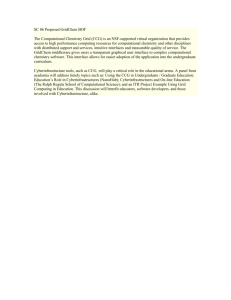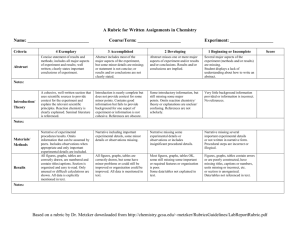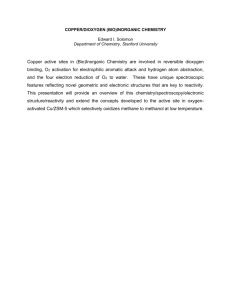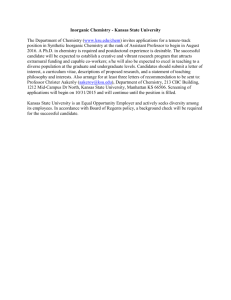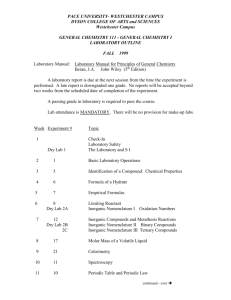4950-Sy-F08
advertisement
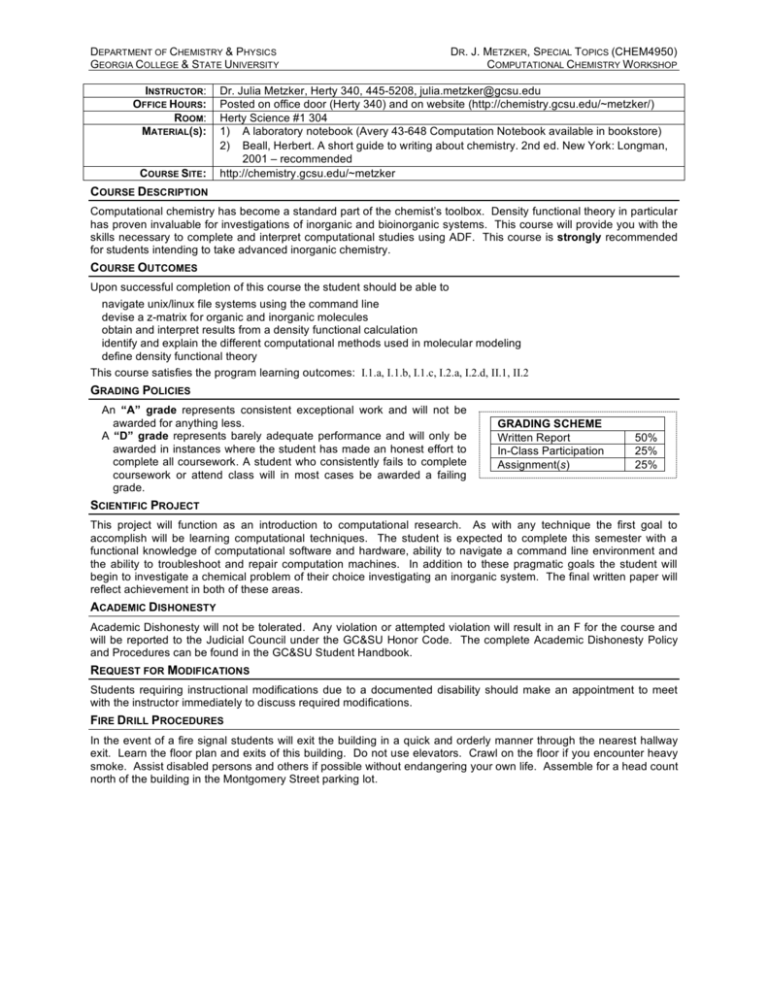
DEPARTMENT OF CHEMISTRY & PHYSICS GEORGIA COLLEGE & STATE UNIVERSITY INSTRUCTOR: OFFICE HOURS: ROOM: MATERIAL(S): COURSE SITE: DR. J. METZKER, SPECIAL TOPICS (CHEM4950) COMPUTATIONAL CHEMISTRY WORKSHOP Dr. Julia Metzker, Herty 340, 445-5208, julia.metzker@gcsu.edu Posted on office door (Herty 340) and on website (http://chemistry.gcsu.edu/~metzker/) Herty Science #1 304 1) A laboratory notebook (Avery 43-648 Computation Notebook available in bookstore) 2) Beall, Herbert. A short guide to writing about chemistry. 2nd ed. New York: Longman, 2001 – recommended http://chemistry.gcsu.edu/~metzker COURSE DESCRIPTION Computational chemistry has become a standard part of the chemist’s toolbox. Density functional theory in particular has proven invaluable for investigations of inorganic and bioinorganic systems. This course will provide you with the skills necessary to complete and interpret computational studies using ADF. This course is strongly recommended for students intending to take advanced inorganic chemistry. COURSE OUTCOMES Upon successful completion of this course the student should be able to navigate unix/linux file systems using the command line devise a z-matrix for organic and inorganic molecules obtain and interpret results from a density functional calculation identify and explain the different computational methods used in molecular modeling define density functional theory This course satisfies the program learning outcomes: I.1.a, I.1.b, I.1.c, I.2.a, I.2.d, II.1, II.2 GRADING POLICIES An “A” grade represents consistent exceptional work and will not be awarded for anything less. A “D” grade represents barely adequate performance and will only be awarded in instances where the student has made an honest effort to complete all coursework. A student who consistently fails to complete coursework or attend class will in most cases be awarded a failing grade. GRADING SCHEME Written Report In-Class Participation Assignment(s) 50% 25% 25% SCIENTIFIC PROJECT This project will function as an introduction to computational research. As with any technique the first goal to accomplish will be learning computational techniques. The student is expected to complete this semester with a functional knowledge of computational software and hardware, ability to navigate a command line environment and the ability to troubleshoot and repair computation machines. In addition to these pragmatic goals the student will begin to investigate a chemical problem of their choice investigating an inorganic system. The final written paper will reflect achievement in both of these areas. ACADEMIC DISHONESTY Academic Dishonesty will not be tolerated. Any violation or attempted violation will result in an F for the course and will be reported to the Judicial Council under the GC&SU Honor Code. The complete Academic Dishonesty Policy and Procedures can be found in the GC&SU Student Handbook. REQUEST FOR MODIFICATIONS Students requiring instructional modifications due to a documented disability should make an appointment to meet with the instructor immediately to discuss required modifications. FIRE DRILL PROCEDURES In the event of a fire signal students will exit the building in a quick and orderly manner through the nearest hallway exit. Learn the floor plan and exits of this building. Do not use elevators. Crawl on the floor if you encounter heavy smoke. Assist disabled persons and others if possible without endangering your own life. Assemble for a head count north of the building in the Montgomery Street parking lot.


